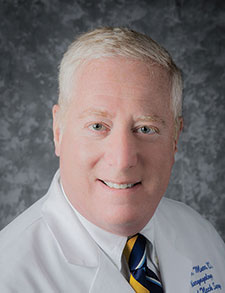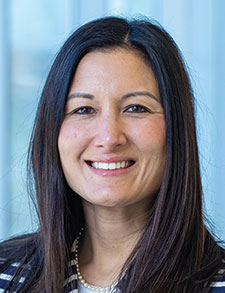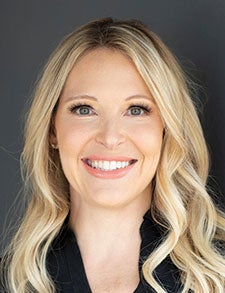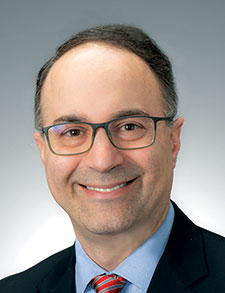The Triological Society will welcome four new leaders in 2025. Two assume their roles after the January Sections Meeting, and two after the May Combined Otolaryngology Spring Meetings. Here they discuss their goals for their tenures and describe TRIO’s importance to the ENT community.
Explore This Issue
September 2024Executive vice president (May 2025)
ENTtoday: As incoming EVP, what do you hope to achieve during your tenure?

Andrew H. Murr, MD, professor and chairman of the department of otolaryngology–head and neck surgery at the University of California, San Francisco (UCSF) School of Medicine, and current TRIO treasurer
Dr. Murr: I intend to drive further progress toward making the concept of membership in our Society more irresistible to individuals who aspire to the Noble Legacy. Some people with whom I have spoken have elucidated that they think the Society is “closed” and insular; however, facts do not support this perspective. Our membership pipeline has been expanded to include a young and dynamic cohort that reflects the makeup of our specialty. In addition, Dana Thompson, MD, MBA, spearheaded the expansion of acceptable thesis categories. This significant expansion has made the Triological fellowship reachable by any individual who is motivated by formal, written, and creative contributions to our field. I envision the opportunity to expand societal-sponsored resources to assist individuals in creating the highest quality contributions, even if they are not in an academic center where services like biostatistical support are more readily available.
TRIO has an opportunity to support our field through enhanced collaboration with our other professional organizations. The American Academy of Otolaryngology–Head and Neck Surgery (AAO–HNS) has a new EVP, Rahul K. Shah, MD, MBA, who is himself a Triological Society Fellow. I am looking forward to collaborating with him and with all of the specialty society leadership teams to make our meetings strong and worthwhile. Our new CME coordinator, Jeffrey Simons, MD, MMM, will play a major role in guiding our meeting content. I am also looking forward to supporting the American College of Surgeons (ACS) and the American Medical Association (AMA) concerning appointments to participate in important committee work such as the Board of Governors and the Current Procedural Terminology Editorial Panel. Additionally, we need to tell our members and fellows what we have done. I am excited that Sarah Bowe, MD, EdM, will oversee social media for our organization.
Our publishing arm is extremely strong, with great editorial leadership. Sam Selesnick, MD, at Laryngoscope, Romaine Johnson, MD, MPH, at Laryngoscope Investigative Otolaryngology, and Robin Lindsay, MD, at ENTtoday, are spectacular. They are supported by a phenomenal volunteer corps of associate editors and reviewers who tirelessly contribute to the high quality of our publications. Our publishing partners at Wiley are equally dedicated. During my term, we will be in discussions with Wiley to continue our extremely successful partnership.
I must also acknowledge our truly superb management office run by Beth Faubel. She directs a team that is quietly effective. Recently, TRIO saw an opportunity to stabilize the back-room management of a trio of our academic societies—the Society of University Otolaryngologists, the Association of Academic Departments of Otolaryngology, and the Otolaryngology Program Directors Organization. As EVP, I hope to ensure that TRIO adds value to these extremely important organizations.
Last, but not least, I will mention our grant portfolio. I am so fortunate to work with Brad Goldstein, MD, PhD, to support his work and his team, which is dedicated to identifying the finest requests for funding that are submitted to our organization. Did you know TRIO gives away more grant funding than any other OHNS [otolaryngology–head and neck surgery] professional organization? We deliver approximately $500,000/year in grant support through our organization’s call for proposals. My goal is to keep our organization financially strong so we can continue to deliver these resources to aspiring principal investigators who are booting up novel research projects specific to our field. Let’s not forget our students, residents, and fellows. They are the future of our field. TRIO delivers travel grants to every student, resident, and fellow who attends our meeting with the submission of a paper or poster presentation. After all, our Society is all about mentorship.
ENTtoday: How will your career and leadership experience benefit the Society?
Dr. Murr: It’s shocking for me to say this, but I’ve been involved in otolaryngology–head and neck surgery for 37 years. I have been the professor and chairman of otolaryngology–head and neck surgery at UCSF for the last 10 years, and I’ve had fantastic mentors along the way. Eugene Myers, MD, wrote my letter of recommendation when I was a student. Dave Eibling, MD, took me through my first surgical operation. William H. Friedman, MD, selected me to be part of his program at St. Louis University. It was a small program, but I had amazing colleagues in the residency. Our chair was Michael D. Maves, MD, MBA. Dr. Maves is amazing in his administrative, educational, and surgical prowess. He was the EVP of our Academy and then the EVP of the AMA for about a decade. Bob Schindler, MD, had enough confidence in me to hire me onto the faculty at UCSF in 1993. Bob was a great boss and was so much fun to be around. He taught me about vision. Roger Boles, MD, was in the office next door to mine. Dr. Boles was a fantastic mentor who advised me on all sorts of issues as I navigated my early career. Anil Lalwani, MD, was a junior faculty member like me. Dr. Lalwani was a fantastic and generous colleague who helped me put together my Triological thesis. Later, my friend and boss David Eisele, MD, taught me about administrative courageousness. My long-time friend Andy Goldberg, MD, who is a colleague at UCSF, exemplifies wisdom and integrity and keeps me on the right track. Myles Pensak, MD, has been a spectacular leadership role model for me. His combination of frankness, insight, and managerial integrity has benefited our society for more than 20 years. What is the common thread? All are Triological Society Fellows.
So, what do I bring? I am a mosaic who absorbed all of these inputs with sponge-like tenacity. All of these people invested mentorship energy in me. I intend to use what I have learned and the experiences that have shaped me to concentrate on our society’s well-being and advancement. Our power is derived from our membership. Harnessing the experiences and perspectives of the membership, and the spirit of volunteerism will be central to the evolution of our society and the evolution of otolaryngology–head and neck surgery as a field.
ENTtoday: In your opinion, why is the Society important to the fields of otolaryngology, laryngology, and rhinology?
Dr. Murr: The Society’s importance is related to its ecumenical nature. It is one of the few societies that encompass the entire range of the field of OHNS. Whether you are a stapes surgeon, a surgeon who is concentrating on cosmetic rhinoplasty, or a surgeon who is pushing the envelope in skull base surgery, you can find content beneficial to your career at TRIO. Publishing and intellectual property, clinically relevant best practices, short videos to enhance nuances of technique that you did not know about, panels that address disparity or global surgery, or just the chance to speak with students and residents over a beer are all waiting for you at the Triological Society in a relatively intimate setting. Why is the Society important? It’s about the history, the quality, and, ultimately, it’s about the mentorship.
Treasurer (May 2025)
Per TRIO’s bylaws, as EVP-elect, Dr. Murr (with the approval of the executive committee), has appointed the treasurer-elect, Yuri Agrawal, MD, MPH.

Yuri Agrawal, MD, MPH, professor and chair of the department of otolaryngology–head and neck surgery at the University of Colorado Anschutz Medical Campus, education director of the American Neurotology Society, a director on the American Academy of Otolaryngology’s Board of Directors, council member of the American Board of Otolaryngology, and past-president of the Association for Research in Otolaryngology
ENTtoday: As incoming treasurer, what do you hope to achieve during your tenure?
Dr. Agrawal: I would like to serve the Triological Society in using its resources to have the greatest benefit for our specialty and our patients by supporting the career growth and development of our trainees and early career members, by funding pilot research that has the potential to substantially improve the lives of our patients, and by continuing to invest in the special TRIO community that keeps us together across subspecialties.
ENTtoday: How will your career and leadership experience benefit the Society?
Dr. Agrawal: I’ve had the opportunity to train and start my career at Johns Hopkins, which was an incredible place to develop a broad set of experiences in academic otolaryngology, including building a neurotology clinical practice, creating a National Institute of Health-funded research program, and working with trainees. Johns Hopkins also provided a strong, supportive environment, where mentoring and sponsorship were baked into the culture. In the last year, I transitioned to the University of Colorado as the chair of otolaryngology. I have tried to be reflective and intentional about the specific experiences and opportunities I had that supported my career growth and path to leadership, and I foster that in my new department.
ENTtoday: In your opinion, why is the Society important to the fields of otolaryngology, laryngology, and rhinology?
Dr. Agrawal: TRIO has a long history and continued commitment to scholarship and excellence across all the subspecialties of otolaryngology. The Society invests its resources in trainees and early career members and, in many cases, provides some of the earliest opportunities for a national platform and visibility. I have really enjoyed TRIO over the years, for example in its sponsorship of the Neely meeting for clinician-scientists at the mid-winter meeting (the only one of its kind in otolaryngology!), and for the opportunity to develop strong friendships in the smaller, friendlier meeting setting. I look forward to serving the Triological Society and to carrying forward in familiar and uncharted areas the enduring value of this society.
Social media coordinator (Jan. 2025)
Following a call for applications and a thorough in-person interview process, Sarah N. Bowe, MD, EdM, was selected as the social media coordinator, and Jeffrey P. Simons, MD, MMM, was selected as the CME/education coordinator.

Sarah Bowe, MD, EdM, pediatric otolaryngologist with the U.S. Air Force, director of pediatric otolaryngology with the Defense Health Agency at Joint Base San Antonio, Texas, program director for the otolaryngology residency program within the San Antonio Uniformed Services Health Education Consortium, and vice chair of education for the division of otolaryngology at Brooke Army Medical Center
ENTtoday: As the incoming social media coordinator, what do you hope to achieve during your tenure?
Dr. Bowe: Over the past few years, Michael Johns, MD, and the Social Media Committee established a solid social media presence, including thousands of followers across a myriad of platforms. I am grateful for the work they’ve done, as it creates a stable foundation for growth.
One of TRIO’s goals is to “encourage, support, and disseminate … the latest basic and clinical research findings and reports on evidence-based medicine” and “provide a forum for the international exchange of ideas and knowledge.” I believe these goals are intimately connected to social media. Social media platforms reach a broad audience base and can share information more rapidly than traditional media. I appreciate that this position is called social media/culture coordinator because the social media component really provides an opportunity to extend the TRIO culture out into the world. These statements also acknowledge the important connection between The Triological Society and its three leading publications, The Laryngoscope, Laryngoscope Investigative Otolaryngology, and ENTtoday. Social media provides an opportunity to share the work being produced by these publications with a wider audience, including individuals outside the field of otolaryngology, enhancing the likelihood of collaboration and further scientific and technical advances.
Initially, I plan to learn from the members of the Social Media Committee what has worked well and where they see areas for improvement. After reviewing a series of posts from each of the platforms, most of the posts highlight content from three publications. There is also a lot of vibrancy in the posts during COSM. I would love to continue that energy throughout the year and expand the content to highlight the research grant, travel award, and thesis programs. Additionally, I think there are opportunities to create more active content, such as videos, which tend to garner more attention than static content. For instance, Reels are incredibly popular on Instagram, and the first two of these were produced during the #Trio2024 meeting. The Reels featuring the Resident Bowl and Women in Oto reception have been viewed 2,137 and 4,477 times, respectively! The joy of attendees sharing their accomplishments and participating in a spirited competition is evident. Throughout my tenure, I hope to showcase more of these vivid examples of the fellowship and community that TRIO seeks to engender.
ENTtoday: How will your career and leadership experience benefit the Society?
Dr. Bowe: Besides being an individual contributor, I have regularly engaged in scholarship to better my own understanding and use of social media. Hashtags serve as topic identifiers that are commonly used on social media platforms to allow individuals to follow specific areas of interest. Unfortunately, the lack of a standardized ontology can lead to the use of multiple overlapping hashtags, which can dilute the reach and engagement of a given post. In 2021, my colleagues and I published an initial ontology in otology and neurotology to improve the dissemination of research and ideas among patients, physicians, researchers, industry, academic societies, and patient-support organizations. (Otol Neurotol. doi: 10.1097/MAO.0000000000003170.) Shortly thereafter, Hayley Born, MD, a member of the Social Media Committee, reached out for advice on performing a similar study in laryngology, which was successfully published in 2022. (J Voice. doi: 10.1016/j.jvoice.2022.06.005.) Most recently, in 2023, my colleagues and I published a complete ontology in The Laryngoscope. (Laryngoscope. doi: 10.1002/lary.30345.) Hashtags are an essential component of social media posting, and consistent usage drives viewership.
I think one of the most important steps with social media would be to develop an ontology for The Triological Society. This would not need to be extensive, but standard language for hashtags relating to meetings and publications would be paramount. For instance, #Laryngoscope yields thousands of results, because it is connected to one of our favorite otolaryngological instruments. However, #TheLaryngoscope yields a much smaller number of results, largely associated with the journal. This would allow individuals to follow the output of the journal more seamlessly. #ENTtoday is already distinct, and one could be devised for #LaryngoscopeIO. Another addition, specifically for posts relating to the journal, would be to tag the publisher, @WileyBusiness. These organizations usually have a larger audience base, which frequently includes other healthcare professionals, thus providing additional opportunities for exposure to intellectual property. These minor adjustments could be implemented across all platforms.
Overall, social media has been embraced by the younger generations, which includes our future otolaryngologists. It is wonderful to see the composition of the Social Media Committee largely focused on residents, fellows, and early-career faculty, many of whose technical savvy surpasses my own. I see the coordinator position as an opportunity to use the research-based knowledge I have gained to support the committee members as they foster relationships with mentors, cultivate leadership and followership skills, and co-develop their vision for the future of TRIO.
ENTtoday: In your opinion, why is the Society important to the fields of otolaryngology, laryngology, and rhinology?
Dr. Bowe: Reflecting on the TRIO goals, a few keywords stand out: “attract, develop, and mentor the best otolaryngologists.” The Triological Society’s statement supporting “inclusion, diversity, and commitment to justice and respect” also speaks to me. What clearly comes across is the intention to expand and develop the next generation of otolaryngologists. This has also been a passion of mine over the past decade, which included support for the creation of Headmirror’s National Otolaryngology Interest Group (NOIG). The purpose behind NOIG is to provide high-quality educational resources to learn about the specialty and to foster a successful match with a specific focus on those individuals who face barriers, including, but not limited to, allopathic students without a home residency program, osteopathic students, and individuals underrepresented in medicine. I see similar efforts to democratize access to our specialty in the extensive support that is offered via TRIO’s travel awards. In addition, the need for guidance early in the career trajectory is exemplified in the speed networking events held at both national meetings. I feel this dedicated investment in our aspiring and future otolaryngologists occupies a unique space among the otolaryngology societies and drew me to further my involvement with TRIO.
CME/education coordinator (Jan. 2025)

Jeffrey P. Simons, MD, MMM, professor of otolaryngology at the University of Pittsburgh School of Medicine, a full-time pediatric otolaryngologist at UPMC Children’s Hospital of Pittsburgh (CHP), and immediate past coordinator for education for the AAO–HNSF
Jeffrey P. Simons, MD, MMM, professor of otolaryngology at the University of Pittsburgh School of Medicine, a full-time pediatric otolaryngologist at UPMC Children’s Hospital of Pittsburgh (CHP), and immediate past coordinator for education for the AAO–HNSF
ENTtoday: As the incoming CME/education coordinator, what do you hope to achieve during your tenure?
Dr. Simons: As medicine and the current healthcare environment rapidly evolve, it is important that TRIO continues to progress to meet the needs of our members, our patients, and our specialty. There have been significant changes in medical education and the role of both meetings and enduring content over the past several years. The goals and approaches to continuing professional development in otolaryngology will continue to change in the future. As the next CME/education coordinator for TRIO, I plan to embrace these changes and work closely with other Society leaders and staff to develop a strategic plan for the organization’s meetings and overall educational program that aligns with its mission and goals.
The role of live meetings in medical education has evolved over the past several years, and the COVID-19 pandemic catalyzed this evolution. Virtual and online educational experiences now play a much more significant role in otolaryngology education. It is now common to attend committee meetings, conferences, and live webinars from home or the office, without the need for traveling to a meeting, with the associated costs and time away from patient care and from family. These virtual experiences will continue to be a significant part of education and professional interaction in otolaryngology. I plan to explore how TRIO can best take advantage of these virtual experiences to meet the educational needs of our members.
There are, however, many advantages to in-person meetings that cannot be duplicated in the virtual world. We need to make sure to emphasize these aspects of TRIO’s in-person meetings to maintain and expand attendance. For example, there is a substantial benefit to getting away from the distractions of the office and hospital to optimize the educational and conference experience. In addition, many opportunities for hands-on simulation and gamification can only be provided in a live setting. Furthermore, in the virtual world, it is not possible to emulate the camaraderie and interpersonal interactions achieved by bringing people together for an in-person meeting. Such interactions are so important for physician wellness, rejuvenation, and inspiration.
ENTtoday: How will your career and leadership experience benefit the Society?
Dr. Simons: Throughout my career in academic otolaryngology, I have been devoted to patient care, education, research, and service, but a significant amount of my focus has been on otolaryngology education. I am particularly interested in innovation in adult learning, embracing new paradigms for medical education, developing new delivery modalities, and increasing the use of simulation and gamification.
I have been actively involved in otolaryngology education on a national level since I was a resident. I served as chair of the Pediatric Otolaryngology Education Committee and just completed a four-year term as coordinator for education for the AAO–HNSF. In this role, I was responsible for the identification, development, promotion, and evaluation of all educational activities of the organization. I collaborated with seven full-time employees on the education and professional development team at the AAO–HNSF led the Education Steering Committee and oversaw all nine AAO–HNSF education committees, with more than 250 volunteer physician members. Several successful and innovative initiatives were developed by the AAO–HNSF education team under my leadership.
As coordinator for education for the AAO–HNSF, I was very involved with strategic planning related to the future of education and meetings for the organization. I was also very involved with the ACCME accreditation process for the AAO–HNSF and was responsible for ensuring the organization maintained a high-quality educational program that met all the ACCME regulatory standards. Furthermore, I collaborated closely with other leaders in the organization to ensure there was integration and alignment of all of the educational programs, including enduring educational products and education from meetings.
Outside the AAO–HNSF, I have served in several other leadership roles in otolaryngology. I have served as a director at large on the Board of Directors of the American Society of Pediatric Otolaryngology (ASPO), a member of the Education and Curriculum Committee for ASPO, chair of the ASPO Membership Committee, and chair of the executive council for the section of otolaryngology–head and neck surgery for the American Academy of Pediatrics. On a state level, I have been very involved with the Pennsylvania Academy of Otolaryngology-Head and Neck Surgery and am a past president of the organization.
My experiences and background in otolaryngology education have helped provide me with the leadership skills, management experience, enthusiasm, creativity, and vision to be successful as the next CME/education coordinator for TRIO.
ENTtoday: In your opinion, why is the Society important to the fields of otolaryngology, laryngology, and rhinology?
Dr. Simons: Since it was founded in 1895, TRIO has been dedicated to disseminating knowledge and scientific information to otolaryngologists to help encourage discovery and improve patient care. Indeed, for more than 125 years, education has been a core pillar of the organization’s mission. TRIO is devoted to attracting and developing leaders in our field and to inspiring and mentoring the next generation of otolaryngologists. The Society also has the unique ability to bring together physicians in various subspecialties within otolaryngology who share common interests in scholarship, collaboration, and excellence in patient care, education, and research.
Lisa Casinger is the editor of ENTtoday.